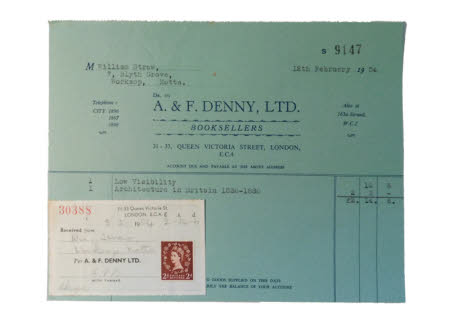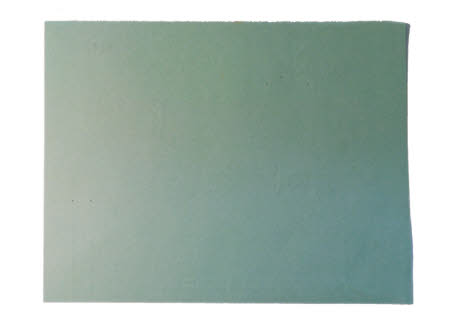Invoice
Category
Ephemera
Date
18 Feb 1954
Materials
Paper
Order this imageCollection
Mr Straw's House, Nottinghamshire
NT 3168105.2
Summary
Green paper invoice No. 's 9147' addressed to 'M William Straw, 7, Blyth Grove, Worksop, Notts.' dated 18th February 19 54' from 'dr. TO A. & F. DENNY, LTD. BOOKSELLERS 31-33, QUEEN VICTORIA STREET, LONDON, E.C.4 Telephone: CITY 1896 1897 1898 Also at 163a Strand, W.C.2 ACCOUNT DUE AND PAYABLE AT THE ABOVE ADDRESS'. The invoice is for two books '1 Low Visibility 12 6 1 Architecture in Britain 1530 -1830 2 2 - £2. 14. 6.'. The bottom is obscured by a white paper receipt stuck to the invoice in the left corner, No. '30388' from '31-33 Queen Victoria St. LONDON, E.C.4.' for the amount of '£2- s.14- d.6' dated 8- 2- 19 54' 'recived from Wm. Straw, Worksop Notts Per A. & F. DENNY LTD.' signed 'J PS WITH THANKS'. On the receipt is a red postage stamp '2d. POSTAGE REVENUE 2d.' in the bottom right corner. The back is blank. The invoice is kept in the book 'Low visibility;. a cartoon history, 1945-1953.' by Sir David Alexander Cecil Low (Dunedin, New Zealand 1891 – London 1963) (record 3168105). Sir David Alexander Cecil Low (7 April 1891 – 19 September 1963) was a New Zealand political cartoonist and caricaturist who lived and worked in the United Kingdom for many years. Low was a self-taught cartoonist. Born in New Zealand, he worked in his native country before migrating to Sydney in 1911, and ultimately to London (1919), where he made his career and earned fame for his Colonel Blimp depictions and his merciless satirising the personalities and policies of German dictator Adolf Hitler, Italian dictator Benito Mussolini, Soviet dictator Joseph Stalin, and other leaders of his times. Low began his career as a professional cartoonist with the Canterbury Times in 1910. In 1911 he moved to Sydney, Australia to join the The Bulletin. During his employment at The Bulletin, Low became well known for a 1916 cartoon satirizing Billy Hughes, then the Prime Minister of Australia, entitled The Imperial Conference. After that success, Low published many cartoons depicting Hughes' forceful and eccentric personality. Hughes was not impressed and apparently called Low a "bastard" to his face. A collection of Low's cartoons of Hughes entitled The Billy Book, which he published in 1918, brought Low to the notice of Henry Cadbury, part-owner of the London Star. In 1919 Cadbury offered Low a job with the Star, which Low promptly accepted. His works are featured in many British history textbooks. One of Low's most famous cartoons, Rendezvous, was first published in the Evening Standard on 20 September 1939. It satirises the cynicism which lay at the heart of the Molotov-Ribbentrop Pact, depicting Hitler and Soviet dictator Joseph Stalin bowing politely before each other after their joint invasion of Poland, but nevertheless greeting each other respectively as "assassin". On 1 September, the Germans invaded Poland from the west and, on 17 September, the Soviets invaded from the east. His satirical works met much criticism in the British public eye. The British press called him a "war monger," and many citizens felt disdain for his depictions of appeasement.

